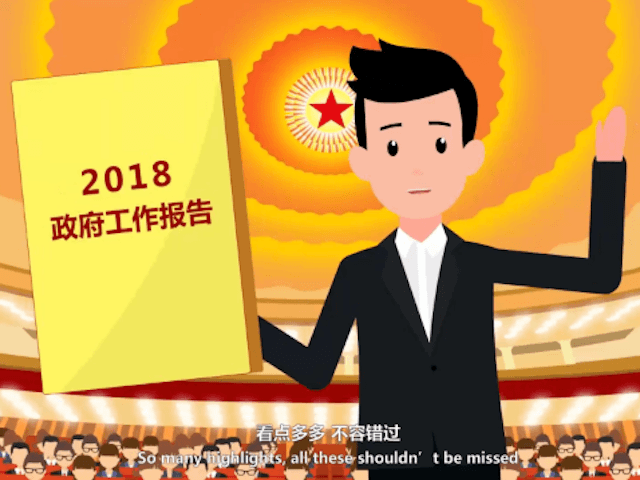The Chinese Communist Party publication People’s Daily debuted an animated rap music video on Thursday celebrating the reforms of the National People’s Congress, warning viewers in cartoon form that “we must fully and strictly implement the party discipline.”
The Chinese government under Xi Jinping has produced several such animated rap videos to present the Communist Party to the world as a modern, popular governing regime. What makes this video different from prior releases is that it is the first such promotional material surfacing on English-language Chinese state media since Beijing banned rap music from the airwaves. After hip-hop videos touting the popularity of “Big Daddy Xi” and urging Chinese teens to join the People’s Liberation Army received a lukewarm reception, and in the face of the dominant popularity of the non-political reality program The Rap of China, the Chinese regime banned hip-hop from television entirely.
The video published in the People’s Daily both celebrates the National People’s Congress, which is meeting for its annual legislating this month, and warns the average citizen that the state expected them to toil to realize Xi Jinping’s dreams.
The translation, offered in subtitles under the bright cartoons, reveals clunky lyrics whose formality undermine the intended levity of the rap. “As is much anticipated, the annual Two Sessions have already opened,” the rap begins, referring to the two sessions of Congress. “So many highlights, they shouldn’t be missed!”
The rap song claims that the reforms passed by the legislature, including the repeal of term limits to potentially allow Xi Jinping to wield the title of president indefinitely, are extremely popular—”All the people, old and young, applaud it!” It also instructs Chinese people that, “closely following the steps of building a moderately prosperous society, our lives will become even better.”
“As there is no free lunch in the world, our dreams could only be realized through our own efforts,” it continues. “We must fully and strictly implement the party discipline.”
The video conforms to a familiar style for those who have followed the creative output of the Communist Party. The animations are similar to the 2015 video “The Reform Group is Two Years Old,” which celebrated “Big Daddy Xi” and his plan to establish strict disciplinary inspections to detain and punish anyone considered to not adhere strictly to Xi’s party doctrine. It is also reminiscent of a video targeting young Chinese people whose title roughly translates to “Marx Is a Millennial,” which employed rap music to make communism attracted to youth.
China has produced many such videos, not all animated, however. Videos by the pro-communist rap group CD Rev tend to have a less jovial tone and feature more aggressive rap music. In songs such as “Force of Red,” the group raps profane tirades against individuals who defy Chinese hegemony and Taiwanese President Tsai Ing-wen in particular. Despite the vulgar content, Chinese state media have promoted the group as a more appropriate alternative to Western hip-hop for Chinese audiences.
Their promotion of such content stands in stark contrast to the censorship faced by the apolitical rappers featured in the hit television program The Rap of China. The reality television show featured locally discovered rappers who presented their material and competed to win the program’s competition but lacked Communist Party propaganda. In January, as the popularity of rappers on the show like PG One and Gai soared, the government announced it would promote “patriotic hip-hop” instead of the more popular content on The Rap of China. The scandal peaked when an old song by PG One mentioning drug use surfaced on the internet, which he blamed on “black music.” PG One promised in an apology to promote the “core values” of the Communist Party in subsequent music, but he remains banned from television, anyway.
By the end of the month, the attempts at depopularizing the reality TV show and its stars had failed so badly that the government simply banned rap from television entirely, despite having spent the past three years publishing rap videos promoting the regime.

COMMENTS
Please let us know if you're having issues with commenting.